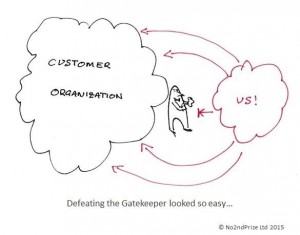B2B Sales Introduction
 B2B (Business to Business) sales adds a level of complexity compared to selling to consumers (B2C). It isn’t a problem, though, it is an advantage. The timelines are longer, so there is more time to interact and learn. Also, on both sides of any deal are people who know they will need to work together – now, and in the future. With the larger scale – and often complexity – of B2B sales, the relationship and sense of trust is surprisingly important. Despite what the Supply Chain and Procurement people will tell you. How, though, do you start to build this relationship?
B2B (Business to Business) sales adds a level of complexity compared to selling to consumers (B2C). It isn’t a problem, though, it is an advantage. The timelines are longer, so there is more time to interact and learn. Also, on both sides of any deal are people who know they will need to work together – now, and in the future. With the larger scale – and often complexity – of B2B sales, the relationship and sense of trust is surprisingly important. Despite what the Supply Chain and Procurement people will tell you. How, though, do you start to build this relationship?
We have all had the experience of being buyers of major purchases – cars, holidays, a place to live… For all of these, price is part of the equation, of course, but you want to know that the company you buy from will be reliable, will step up to the plate if there are problems, will listen to you and understand what matters to you.
Within our businesses, we are buyers. We buy raw materials, we buy expertise and advice, we buy services – and we buy our employees’ time. Of course, we all like to buy at the lowest cost and sell at the highest price, and your business customers will want to do the same thing.
Really, though, they want to get the most cost-effective overall result.
Would you buy something of poor quality, something that is unreliable, expert services from people who might be cheap but don’t really know what they are doing? With B2B, the consequences of failure are often magnified compared to glitches when selling to consumers. To understand how to exploit this, have a look through this section.
Read more in this section:
B2B vs. Consumer
Products vs. Services
Sales Cycle
Sales in a Day
B2B Sales in a Day
Business Development

 No2ndPrize
No2ndPrize